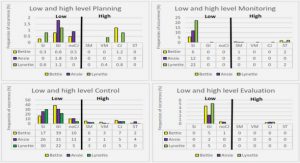Get Complete Project Material File(s) Now! »
Economic Factors
The analysis of the IT infrastructure in relation to e-commerce re-affirms that the diffu-sion of internet is highly dependent upon this infrastructure. However the analysis also shows that a nationwide availability of the IT infrastructure is required as usually the ru-ral areas are less developed than urban areas in this regard. Mercer (2006) also recog-nized that the development of IT infrastructure is low in rural areas and attributes this as a reason for slow diffusion of e-commerce across a country. In Pakistan the IT infra-structure available in urban areas is adequate to encourage e-commerce and the con-sumers also have faith in it, but as we move towards rural areas the IT infrastructure weakens.
This is primarily because communication systems in urban areas are modern in terms of technology while in rural areas outdated technology prevails. The interna-tional telecom companies are also mainly focusing on urban areas; same is the case with internet service providers. This is due to higher demand in urban areas. Slow adoption of e-commerce amongst the commercial sector has been slow due to lack of demand for it by the consumers; hence the commercial sector has also been reluctant in investing in its IT infrastructure. So the IT infrastructure is prevailing and over the last few years, considerable development has been witnessed. The only thing missing is the demand for online purchasing by the consumers in the market. The electrical supply in the country over the last few years has been very inconsistent and shortages have been experienced both in urban and rural areas.
The commercial sector is able to use other means of elec-trical power generation however households don‟t have the same capacity. In such cir-cumstances dependence on the internet in anyway proves to be a bad idea. The popula-tion in urban areas hence has access to better and higher quality IT infrastructure that increases their tendency to use the internet for various purposes.
The role of financial institutions is to provide an online trading system that allows buy-ers and sellers to conduct business over the internet. The more reliable and efficient the system is the more at ease the users will be to transact online. In Pakistan the financial institution are not at all providing sufficient services in this regard. Only one bank is providing merchant accounts which are mandatory for online commercial transactions. The same bank is the only one to provide services for online processing of credit cards. This has been identified as a hurdle for e-commerce development by Hawk, 2004; Hil-bert, 2001. The lack of online trading services provided by banks is primarily because of low demand in the market for these services. The market structure in the country is still traditional economies in nature, due to which the banks have yet showed no interest in providing these services.
Since online banking is a relatively newer idea, consumers are still hesitant in using it and show reluctance to trust the security of the system. The lack of availability of physical delivery systems are also considered as an barrier for e-commerce development as it hinders transportation of good bought online (Wresch, Fraser, 2006). Fortunately in Pakistan these services are provided and are considered to be efficient and reliable. These services are provided nation-wide by the government and by private companies. They include all means of transportation such as air, rail, sea and road.
Socio-Political Factors:
In developing countries, preference to face to face transactions if given over online transactions (McKinsey, 2001) These informal social norms and traditions hamper de-velopment of e-commerce as people are not ready to accept and trust online trading. In Pakistan however there are two different pictures. In the urban areas, the increasing trend of mobile usage is changing the perception and attitude of the people and they are becoming more and more comfortable with this mode of communication. A mobile cre-dit exchange through text messages is one sign of it. Similarly advertising through text messages is also gaining popularity. This phenomena is increasing the trust people have in technology to conduct electronic business. In the rural areas however, the usage of mobile phones is comparatively less. People are more inclined towards using traditional means of communication.
Another interesting finding is the national consumer purchasing behavior. Peer pressure in Pakistan influences buyer‟s behavior and in e-commerce demands a more individua-listic interaction. This is a cultural barrier that will take time to overcome and can be linked to the literacy rate, exposure, awareness of e-commerce benefits and market structures. The role of the government is to provide laws, policies and regulations that not only en-courage e-commerce but provide a safe environment to conduct online businesses.
Ab-sence of these has a negative effect on e-commerce development (Tigre, Dedrick. 2004). The government of Pakistan is providing the basic laws that govern e-commerce activities but most of the initiatives have been unsuccessful. The government has failed to implement the initiative it took in 2001 to turn the government into an e-government. The government itself only has a few websites which are current or have dynamic appli-cations. So over all the government has failed to provide a safe e-commerce environ-ment. The failure of the government to implement e-commerce regulations is not a surprise. The governments over the last decades have in general been unable to have a strong hold over law and order in the country. The geo-political situation of the country has al-so witnessed instability. In these circumstances area such as e-commerce seem to be a much lower priority of the government.
1 Introduction
1.1 Background
1.2 Problem Discussion
1.3 Business Environments & Technology Infrastructure in Pakistan
1.4 Purpose .
2 Theoretical Framework
2.1 Electronic Commerce
2.2 Types Of Electronic Commerce
2.3 Barriers to E-Commerce in Developing Countries
2.3.1 Economic Barrier
2.3.2 Socio-Political Barriers
2.3.3 Cognitive Barriers
2.4 E-Commerce Reforms in Developing Countries
3 Methodology
3.1 Sources of data .
3.2 Qualitative Research
3.3 Exploratory study
3.4 Data Collection Method
3.4.1 Interviews
3.5 Qualitative Sampling
3.5.1 Sample Size Strategy
3.6 Validity and Reliability of Data
3.7 Data Analysis
4 Results of Interviews
4.1 Interviewees
4.2 Results in lieu of Development Factors in E-Commerce
4.2.1 Economic Factor
4.2.2 Socio-Political Factors
4.2.3 Cognitive Factors.
5 Analysis
5.1 Economic Factors
5.2 Socio-Political Factors:
5.3 Cognitive Factors
6 Conclusion
6.1 Limitations
References
GET THE COMPLETE PROJECT
BARRIERS IN THE DEVELOPMENT OF ELECTRONIC COMMERCE: A STUDY OF PAKISTANI ENVIORNMENT





